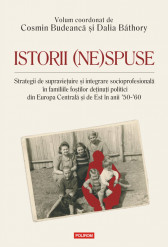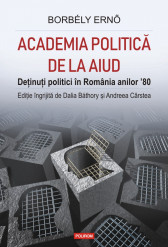
History of Communism in Europe: Vol. 6 / 2015
44.00 Lei · 1 ofertă
Salvează ca:
Salvată ca:
Salvează ca:
Salvată ca:
Cel mai mic preț
Titlu folosit de magazin
Preț
Magazin
History of Communism in Europe: Vol. 6 / 2015
Carturesti · În stoc
44.00 Lei
Istoricul prețului
Descriere
FOREWORDRadu Preda: What Must We Not ForgetARGUMENTDalia BATHORY: Authoritarian and Post-authoritarian Practices of Building Collective Memory in Central and Eastern EuropeAbstract: Among the most used expressions in scholarly articles concerning collective memory, is “dealing with the past”, or its more specific alternative, “dealing with the traumatic past”. This is a rather inexact formulation, because what scholars, artist, curators deal with is not the past in itself but the manner in which it is narrated and represented, or remembered, reconstructed. A series of questions are triggered by this statement: who “remembers”, for what purpose, with what consequences? The scope of this yearbook is to present two different ways of approaching the construction of collective remembrance: the authoritarian one and the post-authoritarian one. The articles discuss case studies of collective memory and identity building in Communist Romania, comparative studies of participative art in post-authoritarian regimes in Central and Eastern Europe, or intricate artistic approaches of traumatic collective memoriesI. COMMUNISM EMBEDDED – BOOKS, SHELVES, CURTAINSRuxandra CAMPEANU: “Revis(it)ing the Romanian Cultural Heritage” during Gheorghe Gheorghiu-Dej’s Regime: The Role of Literary Critics in the Battle for the Canon as a Form of Preserving the Cultural Memory of a CommunityAbstract: As an instrument of preserving the cultural memory of a community, the literary canon is usually a highly stable structure in its core elements. However, with the advent of the Communist regime after the Second World War, the Romanian literary canon underwent a drastic process of reconstruction. As early as the 1940s, what was euphemistically dubbed “revisiting our cultural heritage” actually equated to a radical revision—a purge of the literary canon through the fi lter of Marxism-Leninism. Not only writers of literature, but literary critics themselves were subjected to this process. In this paper, I aim to discuss the role played by literary critics active during Gheorghe Gheorghiu-Dej’s regime in rehabilitating their predecessors. My focus will be on the press debate surrounding Titu Maiorescu’s rehabilitation in 1963.Claudia SERBANUTA: Memory Exercises in Public LibrariesAbstract: The main roles of libraries are developing and providing access to collections of cultural heritage. While the specific policies necessary to accomplish these roles may vary across diff erent types of libraries, these institutions have at their core a dual role in preserving and supporting access to documents illustrating an era of knowledge and culture. Libraries are thus signifi cant institutions in the process of learning, but also in that of remembering and forgetting at a social level. This article provides an overview of the structure and organization of the public library system in the last two decades of the Communist regime in Romania. As part of a larger information history project, the research discusses the characteristics of this system created to support mass education and the ways in which public libraries also became institutions of memory in Communist Romania. The description of the library system structure is enriched by an overview of the professional training available for librarians and descriptions of the main library services related to access to collections and memories....
Detalii
- Categorie
- Timp liber / Reviste si publicatii
- Autor
- Dalia Bathory, Various Authors
- Editura
- Zeta Books







